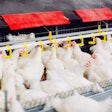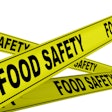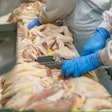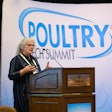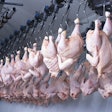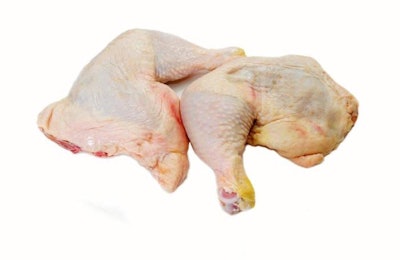
The global population is steadily growing, as is its appetite for meat, and the world’s animal protein producers are facing challenges like never before.
As global incomes increase, developing nations want more quality meat in their diets. At the same time, consumers in developed countries want to know more about where their food comes from and are demanding better animal welfare. And, farmers face a limited supply of natural resources and demands for better environmental practices.
On November 16, WATT Global Media gathered a panel at EuroTier 2016, in Hanover, Germany, of animal health, animal agriculture and financial professionals to discuss these problems and others facing the global poultry and pig businesses. The panelists were Nan-Dirk Mulder, senior global animal protein analyst and associate director at Rabobank International, the Netherlands; Dr. Paul Wigley, professor of avian infection and immunity at the University of Liverpool, U.K.; Dr. Alberto Redondo Cardeña, commercial director at Grupo SADA p.a.S.A., Spain; and Mick Sloyan, strategy directory at the U.K.’s Agriculture and Horticulture Development Board Pork. The event was sponsored by Danisco Animal Nutrition and moderated by former WATT employee and consultant Peter Best.
Here are six topics the panelists covered spanning animal welfare, antibiotic-free (ABF) production and antibiotic stewardship and the factors influencing long-term consumer demand:
1. Can consumers have it all?
The panelists were asked if there is a way for the global poultry and pig industries to give consumers everything they want. Can producers provide low prices, high quality and safe meat from animals raised to good welfare standards?
Cardeña, representing Spain’s largest poultry integrator, said the consumer cannot have it all. A compromise must be made. Producers must respond to consumer trends and demand, but consumers often are not willing to pay a price that covers production costs.
Wigley agreed, saying that, to feed the world, some degree of intensive agriculture is necessary. It’s possible to further reduce antibiotic use and improve welfare, but the idealized small, idyllic farm is impossible when billions must be fed. Consumers from developed, western nations are free to eat less meat but, he argued, it is wrong to dictate farming practices in developing countries.
While some western food companies are investing in meat alternatives, most of global agricultural investment is heading into conventional production. Sloyan said this is especially true in China, where modernization and adoption of western technology and methods can improve production without using more natural resources.
However, farmers should not use the need for intensification to abandon animal welfare. Recent evidence shows producers can adapt their practices to improve welfare without losing productivity.
Over the next 20 years, according to Mulder, the global meat industry will need to produce 45 percent more. This is a big challenge, he said, and producers are not keeping up with demand. A shift toward more efficient production throughout the entire supply chain must be made.

The four panelists – Alberto Redondo Cardeña, Dr. Paul Wigley, Mick Sloyan and Nan-Dirk Mulder – recognize that the response to growing demand for meat would vary from country to country, and that science and modern technology would help to improve efficiency.
2. Do consumers care about sustainability?
Wigley said consumers care about sustainability, but there is a misunderstanding. Consumers do not understand the achievements in lower greenhouse gas emissions and higher feed conversion in modern pigs and poultry farming.
Some consumers use sustainability as a purchasing factor, Wigley said, but some people mistakenly believe that free-range or organic products will be free of foodborne disease. In fact, the risk is higher in alternative systems.
While consumers consider welfare and sustainability as part of how “healthy” a product is, Wigley said more education is needed to demonstrate how treating sick animals – and not treating sick animals – is an animal welfare issue. Producers must also consider that animals with better welfare are healthier and therefore more productive.
3. Are consumer concerns becoming globalized?
Every market is different, Mulder said, but there is some similarity in the west. European concerns, about antibiotic use and layer housing, for example, are moving to the United States and vice versa.
In emerging markets, things are different. In Asia, especially in China, food safety is the chief concern. Chinese chicken consumption is dropping every year, because consumers have lost some trust in the white broiler. They see it as a western product, and western concerns about antibiotic use are harming the meat’s image in the country.
Cardeña said, in his company’s experience, European consumers are more demanding than those in Asia and Africa. European consumers are asking for quality products, but welfare and antibiotics are not major concerns.
4. Which technologies show promise in ABF poultry and pig production?
Wigley said the genetic basis of the animals and their microbiota are only beginning to be understood. There are many possibilities to manipulate the microbiome to improve production. Vaccination could be more used to reduce the harmful effects of diseases and the need for therapeutic antimicrobials.
While there could certainly be lower usage of antibiotics, farmers should always keep antibiotics as a tool to cure sick animals. The removal of growth-promoting antibiotics in the European Union is a good thing, he said, as is the reduction of antibiotics as prophylaxis.
5. What role do supermarkets and NGOs play in setting new standards for products?
Food retailers can have a large impact on the meat market. In the U.S. and Europe, a handful of companies control the largest part of the market, and they are always looking to improve business.
Non-governmental organizations (NGOs) with a special interest can, and do, try to influence and pressure brand owners to change their practices.
Supermarkets are also looking to differentiate themselves from competitors using standards. Mulder said this is already happening in the Netherlands, where retailers are largely switching to stocking only one type of product. The same thing is happening in France, Germany and the United Kingdom as well.
6. Who is the voice of the consumer?
People are mistrustful of large food companies, and food producers must speak for themselves to win back public trust. With governments, retailers and special interest groups all purporting to represent the consumer and confusing the conversation, companies need to take responsibility for their own image and consumer perception.
Sloyan said that in the U.K., for example, consumers lost trust in the food supply due to a scandal involving horse meat entering supermarkets’ meat supplies. It exposed how supermarkets may not fully control the quality of their supply chain and cannot speak for its integrity.
For the retailers, the question is now: What is being done to protect your brand? ABF production can be just another way to differentiate and promote products, Sloyan said
To properly respond to adversarial groups, the industry needs to develop a body of equal weight, a voice that speaks for it representing the producers and retailers. Producers must be more transparent, using facts about products and processes to overcome the challenges. The first step, Sloyan said, is to get its message out into the media and to consumers.

Producers must be more transparent, argues Sloyan, using facts about products and processes to overcome challenges.
To watch "Navigating the forces that will shape the future of poultry and pig production," go to:













